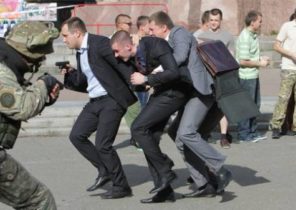
The cease-fire by the Syrian President and a dozen rebel groups have signed still on December 29, after with the assistance of Russia and allies of Assad from Iran, Iraq and Lebanon, the rebels conquered the whole territory of Aleppo. But the fighting has not stopped. New peace talks on Syria in Kazakhstan were given a hope that Bashar al-Assad, Russia, Turkey and the part of the rebels could be to make concessions. However, it would be naive to think that the new negotiating platform in Astana may soon to bring peace in Syria. Why new negotiations have not produced visible results and why the parties are unable to agree, says associate specializing in the middle East in “Chatham house” Hyde Hyde.
The divergence in views among the Pro-government forces makes discipline difficult. So, the Pro-government Syrian militias under the mediation of Russia has repeatedly interfered with the implementation of the agreements that were aimed at reducing violence. Although the same problems and brought the rebel group. After all, total control of Turkey over the route of the Syrian rebels forcing you to follow their instructions of Ankara, which sharply does not coincide with the agenda of the supporters of the Syrian regime.
The interest of Russia, after her successful defense of the Syrian regime, is to end as soon as possible to the Syrian conflict. The Kremlin appears keen to transform its role in Syria: from the military “actor” to become a peacemaker, preserving in this way the leverage. In the long term, the goal is to regain a strong Syrian government with functioning institutions and a monopoly on weapons.
On the contrary, the vision of Iran is based on the support of the militia, as is happening in Lebanon and Iraq to protect their long-term interests and preserve its influence in post-war Syria and the region. Iran believes that military operations in the country should be continued after the victory of the regime.
Thus, Iran recently, in some cases, urged their fighters to speak out against Russia’s position. During the last offensive of the regime in Eastern Aleppo Russia, together with Turkey have agreed to allow civilian and rebel groups to move to other areas which are held by rebels in Northern Syria. Iran sabotaged the decision. Then the agreement was revised to include the requirements of the Tehran evacuation of the two besieged rebel-Shia towns in Idlib.
Moscow is cooperating with Turkey, and concluded a truce with the rebel groups to pave the way for ongoing peace talks. Iran, which had not ratified the agreement on cease-fire, instructed his “client” for Hizbollah to break the ceasefire and continue their attacks on the city by the river of Wadi Barada in Damascus. Hezbollah banned Russian military ranks, to enter the city.
The real challenge now is for the regime and its allies together agreed on measures to strengthen trust and the existing fragile cease-fire. Peace talks, therefore, should not be organized only between the Syrian regime and the opposition, but also is held among the allies of the regime.
Hyde Hyde — associate specializing in the middle East.







